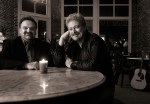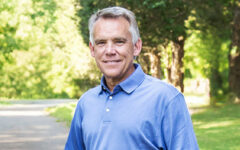 Sometimes it can be a tad disconcerting reviewing the many recordings that come across our desk each week. Sure, there is a lot of good music, but not so much really great music – the sort that demands multiple listenings over the first few days. Listenings which don’t just let the sound wash over you, but involve careful study of all the elements that make it extraordinary.
Sometimes it can be a tad disconcerting reviewing the many recordings that come across our desk each week. Sure, there is a lot of good music, but not so much really great music – the sort that demands multiple listenings over the first few days. Listenings which don’t just let the sound wash over you, but involve careful study of all the elements that make it extraordinary.
Am I asking too much of the average bluegrass/acoustic/Americana project? Perhaps so.
But then there are days when a CD like Steve Gulley and Tim Stafford’s Dogwood Winter hits, and you realize that there are artists pursuing excellence, and achieving the goals they set with admirable aplomb.
This album is described as a songwriter’s project, a chance for Steve and Tim to record some of the many songs they have written together over the years and, for my money, there are no more consistently thoughtful songwriters in or around bluegrass than these two. Stafford has seen many of his compositions recorded by his regular group, Blue Highway, as has Gulley with Mountain Heart and now Grasstowne. Both see writers’ credits on new recordings by other artists, and Stafford has essentially created a sub-genre in bluegrass with his Wild West bio-ballads.
Dogwood Winter covers a surprisingly wide stylistic swath, given that all 14 songs come the same two writers. There is hard driving bluegrass, both traditional and contemporary, mixed in with reflective and introspective anthems of love and loss – most of them about hard life, hard people and hard times. A few are ultimately hopeful songs, and even the tragic numbers come across expressing “the way it is,” without finger-pointing and blame-mongering. Bad stuff happens – and it happens a lot in Tim Stafford songs.
Returning to a point made above, it bears repeating that honest criticism requires that the critic assess the success of the work in question as against the goals set by the artist. It is both unfair and profoundly ignorant to blast an artistic endeavor for failing to be something it never set out to be – or to praise it for achieving a goal that exists only in the critic’s imagination.
 Let’s use the title track as an example. Dogwood Winter is a colloquial term for a late frost, a damaging one that hits roughly at the time the dogwoods bloom. This song uses that phrase as the starting point for an exploration of the ruin and loss experienced by a family that follows a dream to “the land of milk and honey where the dogwood blossoms bloom.” It’s set in Dorian mode, using an uneven meter, and with the lyric written in a conversational style appropriate to the US pioneer era in which it takes place.
Let’s use the title track as an example. Dogwood Winter is a colloquial term for a late frost, a damaging one that hits roughly at the time the dogwoods bloom. This song uses that phrase as the starting point for an exploration of the ruin and loss experienced by a family that follows a dream to “the land of milk and honey where the dogwood blossoms bloom.” It’s set in Dorian mode, using an uneven meter, and with the lyric written in a conversational style appropriate to the US pioneer era in which it takes place.
I’ve argued repeatedly that it requires far more skill and discipline from a songwriter to compose in this sort of “archaic” style than to either settle in a contemporary groove or push accepted boundaries. Tim mentions in his song notes that their hope here was to evoke the old time storytelling style of the great Doc Boggs. See how well they accomplish this in these second and third verses, and then listen to a sample of the track.
We loaded up our wagons, every cow and every hen
Down the new cut road where Captain Boone led his gallant men
Past the Gap beyond the White Rocks by the pale and waxing moon
To the land of milk and honey where the dogwood blossoms bloom
We built our cabin in the springtime and there came a bitter chill
Till the frost took all our corn and the land was deathly still
We planted by the signs but winter came too soon
To the land of milk and honey where the dogwood blossoms bloom
Dogwood Winter: [http://traffic.libsyn.com/thegrasscast/dogwood_winter.mp3]
Simply brilliant… You could fool many a folklorist, insisting that it was a recently-discovered song from the late 18th century. Bravo.
Another great example of both deft songwriting, and Gulley’s terrific voice, can be found in You Hurt Me All Over Again, one of my favorites he and Stafford have written. It tells the familiar story of recovering from heartbreak, only to be pulled back in at unexpected moments. The song also demonstrates what a stellar harmony singer Dale Ann Bradley is. She makes any track sound better, and is the icing on the cake here.
You Hurt Me All Over Again: [http://traffic.libsyn.com/thegrasscast/you_hurt_me.mp3]
Of course, there has to be another episode in the Wild West saga. On previous albums Stafford has told the stories of Wild Bill Hickok and Billy The Kid; here he and Gulley tell of Doc Holliday through the eyes of his longtime companion, Katie Elder.
Just Another Setting Sun: [http://traffic.libsyn.com/thegrasscast/setting_sun.mp3]
Lastly, let’s examine one of two decidedly non-bluegrass tracks that appear on Dogwood Winter, songs that will nevertheless have a strong appeal for anyone who appreciates good songwriting and acoustic music. Torches, another interesting take on the “love song” genre, was written with James Taylor on their mind. It is also a vocal showpiece for Gully, who sings lead and the first harmony part, with Dale Ann up top. Gorgeous.
Torches: [http://traffic.libsyn.com/thegrasscast/torches.mp3]
The supporting musicians turn in inspired performances here as well. Ron Stewart is on banjo and fiddle, Justin Moses on fiddle and resonator guitar, and Adam Steffey on mandolin. Tim plays guitar and Gulley bass, and this core group gives the album a true band feel, even with Michael Avery on piano and Mark Laws on percussion for two tracks. The accompaniment is sparse but spot-on at all times.
Dogwood Winter is one of the most compelling records in bluegrass/acoustic music this past few years. It uses a formula that never fails: great songs, strong performances, simple, appropriate arrangements, and honest, transparent recording. That may not sound difficult, but it’s a narrow target to hit.
Audio samples from all 14 tracks can be found at Amazon.com, and the CD is available wherever bluegrass music is sold. Rural Rhythm is in the process of switching online distributors, so the album won’t be available in iTunes until September.







